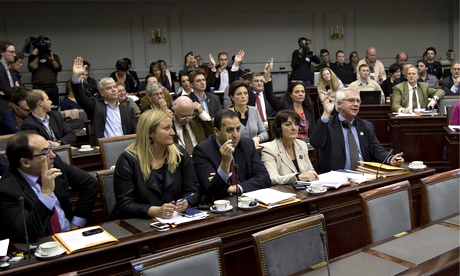London has breached its annual air pollution limits just five days into 2017, a “shameful reminder of the severity of London’s air pollution”, according to campaigners.
By law, hourly levels of toxic nitrogen dioxide must not be more than 200 micrograms per cubic metre more than 18 times in a whole year, but late on Thursday this limit was broken on Brixton Road in Lambeth.
Many other sites across the capital will go on to break the annual limit and Putney High Street exceeded the hourly limit over 1,100 times in 2016. Oxford Street, Kings Road in Chelsea and the Strand are other known pollution hotspots.
NO2 pollution, which is produced largely by diesel vehicles, causes 9,500 early deaths every year in London. Most air quality zones across the country break legal limits and the crisis was called a “public health emergency” by MPs in April. This week scientists said that one in 10 cases of Alzheimer’s in people living near busy roads could be linked to air pollution.
The new mayor of London, Sadiq Khan, has pledged new measures and to double funding to £875m over five years to tackle the problem. But the UK government’s plans have twice been ruled illegal in the past two years and it has been sent back to the drawing board to develop a third strategy.
Alan Andrews, a lawyer at ClientEarth – the group that successfully sued the government – said: “This is another shameful reminder of the severity of London’s air pollution and shows why the mayor has rightly made tackling it a top priority. It is absolutely essential that he now delivers on his promises and that the national government back him to the hilt.”
Andrews, who lives in Brixton, said Khan had promised an expanded ultra-low emission zone in 2019, which limits polluting vehicles, and to deploy the cleanest buses on the most polluted roads.
“While these are vital steps in the right direction, we can’t wait another three years for action,” he said. “We need immediate action to cut pollution in the short-term and protect Londoners’ health during these pollution spikes.” In December, Khan issued air pollution alerts at bus stops, tube stations and roadsides due to high levels.
A spokesman for the mayor said: “The Brixton Road [breach] underscores why urgent action is needed to improve air quality across London.” He said Khan would shortly be announcing 10 new low emission bus zones, including one for Brixton Road.
“But this is not enough,” said the spokesman. “The government needs to match the Mayor’s commitment to improving air quality as quickly as possible.”
In December, Paris, Madrid, Athens and Mexico City pledged to ban polluting diesel cars from their centres by 2025 and a number of cities outside the UK have already taken action such as banning cars on specific days or making public transport free.
The government must produce a new national plan by April and ClientEarth said this must include clean air zones in many areas to stop the dirtiest diesel cars entering pollution hotspots. ClientEarth also said the “peverse” financial incentives that encourage people to buy diesel cars rather than cleaner ones must be ended.
Both a national network of clean air zones and tax changes were proposed within government as part of its last plan, but were rejected by the Treasury.
This week new data also revealed that modern diesel cars produce 10 times more NO2 pollution than heavy trucks and buses per litre of fuel, which experts say is due to the much tougher testing faced by heavy vehicles.
London breaches annual air pollution limit for 2017 in just five days
